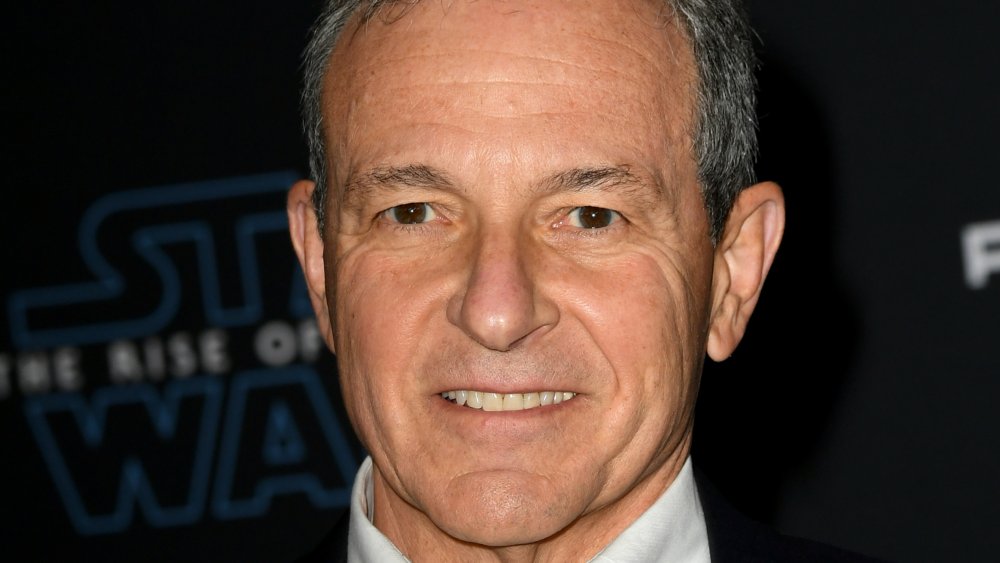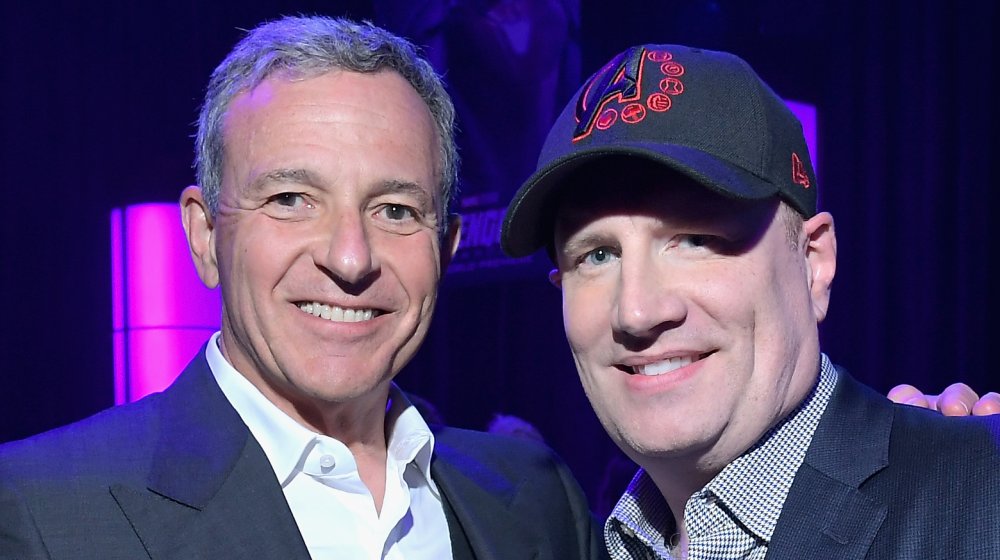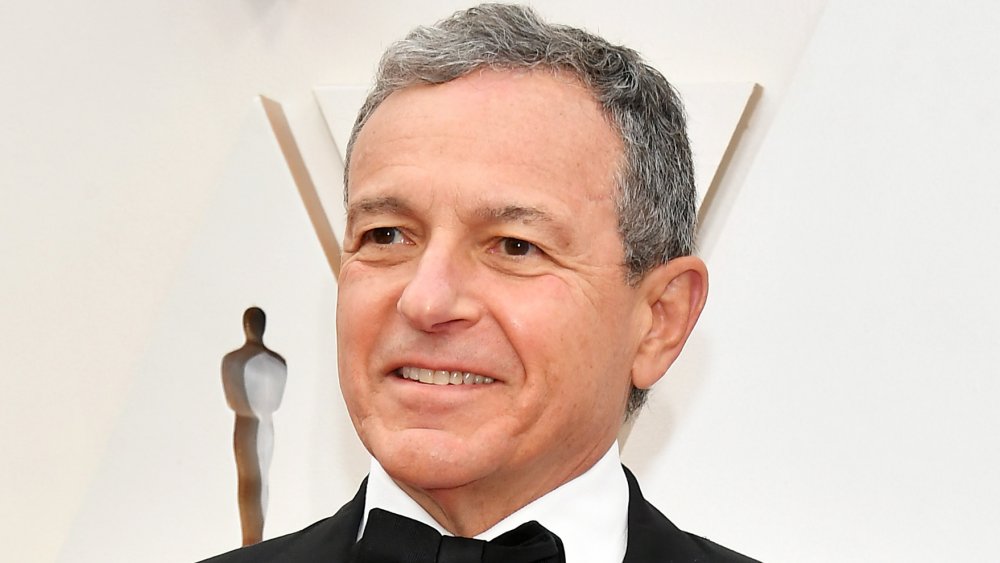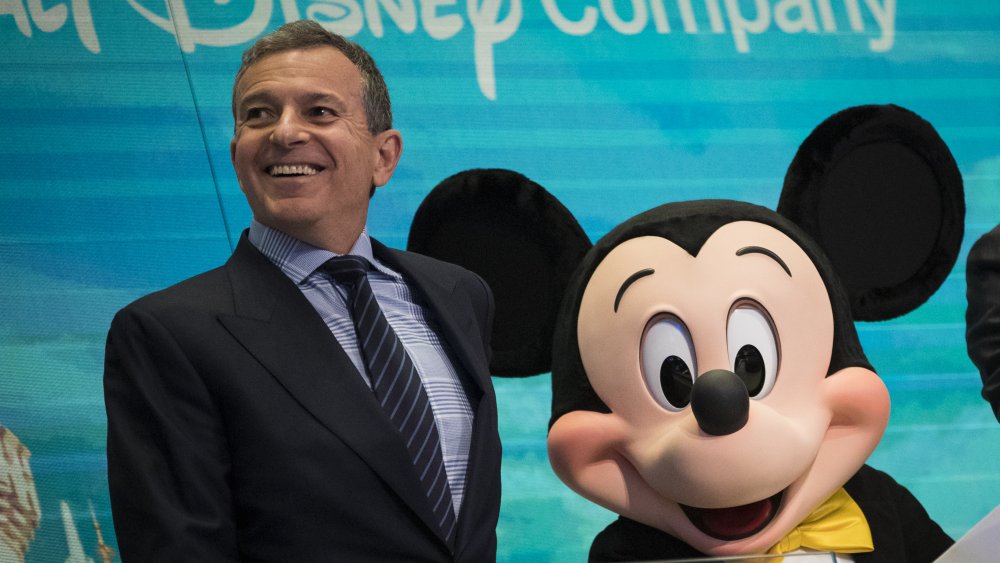What Bob Iger's Departure Means For The Future Of Disney
On February 25, 2020, it was announced that Bob Iger — after a stellar 15-year run as CEO of The Walt Disney Company — was stepping down, a development which sent shock waves through the world of entertainment. Iger presided over a period of growth and expansion for Disney the likes of which are seldom seen in any industry; under his watch, the value of the company increased five-fold (via BBC).
Of course, Disney's jaw-dropping growth isn't entirely down to Iger; the man who will replace him as Disney's chief executive, Bob Chapek, likewise oversaw a period of remarkable growth for Disney's Parks and Resorts segment after becoming its chairman in 2015. It was Iger, though, who spearheaded the many multi-billion dollar deals which made Disney the dominant film and television force that it is today — and even though he'll remain on board as Executive Chairman through 2021, the news of his stepping down as CEO caused Disney's stock to immediately take a significant tumble.
We're pretty sure it'll recover, though — because even though Disney's fearless leader is departing, the moves he made during his decade and a half at the helm have ensured that the future is still bright, and that his fingerprints will remain all over the company, probably forever. Here's how Bob Iger helped transform Disney from a relatively bit player in the entertainment industry into a media juggernaut, and what the future of the Mouse House will look like without him.
Bob Iger's deal-making savvy will be missed at Disney
To refer to Disney as an entertainment monopoly isn't technically accurate, but it sure is close. The film and television studios and wealth of assets that the company has acquired during Iger's tenure are nothing short of staggering — and to his credit, these acquisitions were made with the intent of allowing each of those properties to retain their unique, individual identities. One could even make the case that the majority of the studios absorbed by Disney have fielded their best output since coming under ol' Mickey's umbrella; it's actually a pretty damn easy case to make.
Take, for example, Disney's first high-profile acquisition: its 2006 purchase of Pixar Animation Studios. Before the acquisition, Pixar had produced six features in nine years; in the 14 years since, the studio has produced 15 films (with two more on the way this year), eight of which have won the Academy Award for Best Animated Feature.
Then, of course, there's Disney's 2009 purchase of Marvel Studios, which has seen its Marvel Cinematic Universe balloon into the highest-grossing film franchise in history by a mile since coming under Disney's umbrella. The Mouse House's 2019 acquisition of Fox Studios (and its vast library of content including such valuable properties as The Simpsons and Avatar) is likely to only look more and more savvy as time goes on, and while Disney's 2012 absorption of Lucasfilm has so far produced mixed results on the feature film front, the property remains one of the most popular in the world — and endeavors such as the Disney+ series The Mandalorian and the multimedia project The High Republic are opening up new storytelling avenues for the galaxy far, far away.
Iger's astute dealmaking capabilities, then, will be sorely missed — but his impact on the company will still be felt long after his departure.
Bob Iger helped to set Disney up for a bright future
Fortunately for Disney, Iger's time steering the ship looks to have set a firm course for the future direction of the company. All of those high-profile acquisitions are likely to keep paying dividends for decades; Pixar and Marvel, in particular, have become two of the world's most beloved brands, and neither of them look to be easing up on the gas any time soon.
Those brands will continue to be at the forefront of the public consciousness due to their presence on Disney+, which is positioned to pose a serious challenge to Netflix as the dominant streaming service. This is also thanks in no small part to the incredibly deep Fox Studios library, which Disney has only just begun to mine. And hey, those legacy properties that can't find a place on the family-friendly streamer can always find a home on Hulu, which is also now owned by the House of Mouse.
Indeed, it's largely thanks to Iger that Disney can make a legitimate claim to being the dominant force in the world of entertainment — and even though the exec will soon be hanging up his mouse ears, it's also thanks to him that this isn't likely to change anytime soon, if ever.
Disney will probably continue to dominate the entertainment world without Bob Iger
Iger's successor, Bob Chapek, has been with Disney since 1993 — and, like Iger, he's demonstrated a remarkable ability to grow those segments of the company over which he presides, and to assimilate vast amounts of knowledge while on the job. In his most recent position as chairman of Walt Disney Parks, Experiences and Products, Chapek guided that division through an impressive period of sustained growth; Iger has said that the choice of Chapek to take his place was made to ensure a "smart transition process," describing him as having worked "closely and collaboratively with leaders across the different segments of [the] company" (via the Los Angeles Times).
As for Chapek, he's made it clear that the transition doesn't herald any significant change in direction for Disney; quite the opposite. Speaking with CNBC on the day the handoff was announced, Chapek said, "[Iger's] legacy in the company is just profound. I think my role is to take the strategic pillars he's so well established over the last 15 years, and continue to work on those and implement those in the marketplace, most importantly our direct-to-consumer initiatives, but at the same time look around the corner for what disruption might be going on in the marketplace that would necessitate a fresh look at those things."
Chapek continued, "Right now, the course that [Iger] has laid is one that we fully intend to follow, and I think will pay dividends for our shareholders for years to come." Translation: Disney's quest for world domination is far from over, and Chapek intends to fuel the Mouse House's explosive growth every bit as aggressively as his successor did. Or, to quote Roger Daltrey: meet the new boss, same as the old boss.



